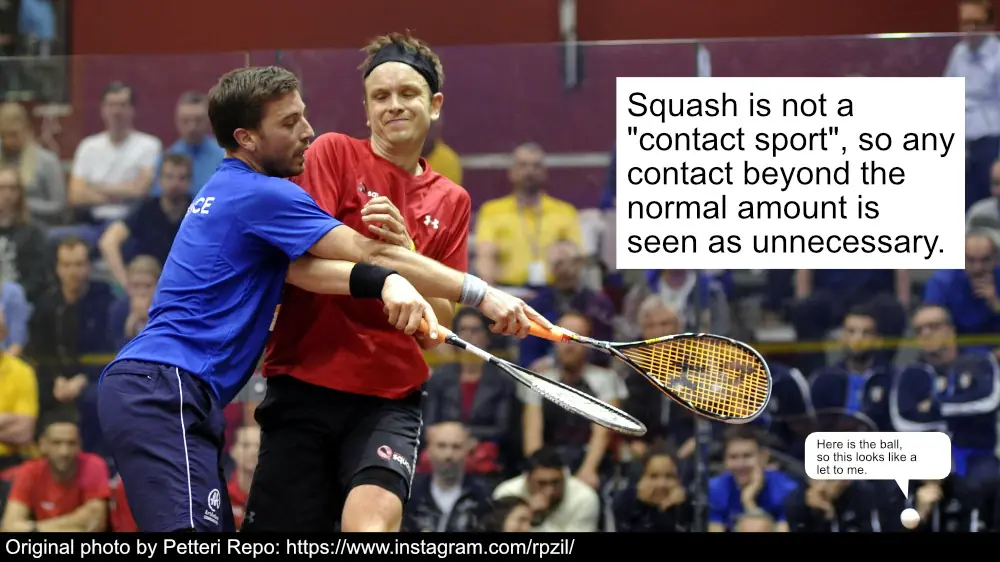10 December 2022 / 3-Min Read / Translate
I love chatting with other squash players and received this message via Instagram (which by the way is a great way to contact me).
Aggressive Players: I’ve been trying to find something about playing against aggressive opponents but I don’t think I found any. Do you have a blog about that which I might’ve missed? Thanks 🙏🏼
Anonymous
I’m never lacking an opinion or point of view, but in this case I thought I would do a little crowd-sourcing and see what other people thought, so I posted on Facebook, Reddit and Twitter. The responses fell into four camps (types of responses).

James Willstrop doesn't look too happy with this unwanted contact, although in this case, it's just a let due to accidental interference.
That’s easy to say, but often hard to do. Perhaps the opponent is one of a group of friends and it would be rude to refuse to play against them or perhaps it’s some sort of official competitive match and walking off after the first incident is not possible, especially if it is a team event. I’ve never refused to play against anybody, and I have played a few matches against these types of players, but honestly, perhaps this crowd is right. if we allow players to continue this behaviour nobody benefits. We just pass the responsibility onto the next player they play against.
Sometimes these types of players are using their physicality as part of their squash arsenal and don’t see it as a problem. if we just allow them to do that, they and other players like them will continue to do it. What better way to signal our feelings than a refusal? So, this approach definitely has its merits. It’s one we should all aspire to, but we have to consider the consequences and decide accordingly.
The next camp accepts that if this happens in competitive matches, then you must appeal to the referee. Although I would argue that the referee should be dealing with this by themselves. We shouldn’t have to appeal for the ref to take action against these types of players. That sets a dangerous precedent: it’s only a problem if the opponent objects.
If this is a “friendly” match i.e. not officially competitive, then refusing to play seems the right solution depending on the aggressiveness. But why should they win the match in these cases? Somebody mentioned that the second time they played a particularly aggressive player (having lost the first time) they decide to “exaggerate” the situation by dropping their racket on impact and even falling to the floor in “pain”. it’s worth mentioning that this situation was created by the innocent player using deception to trick the opponent who them ran into them – causing their own interference. The referee then has to take action because clearly play can not continue. it’s a risky approach and one that in this case nearly started a fight.
Camp number three feels that if their opponent is going to be physical, then so can they. “Play them at their own game” is a phrase used in English to say do to them what they do to you. I understand their sentiment, but it assumes that players are able and willing to be more physical. Not everybody wants that. I’m not a small person (1.8 metres, 75Kg) but I don’t want to have to bump into other players just to make a point.
I also feel that this is kinda what the aggressive player wants. They have drawn you into their style of game and are almost certainly better at it than you. Some responders to my post even suggested hitting them with the ball in retaliation, which I can not support at all. All in all, this is the only camp I completely disagree with. Unless you enjoy fighting, I suggest you avoid this approach.
The final camp says that we should adapt our game to face this challenge. I like this approach as it is no different from any other tactical problem. I don’t like the idea that the player is allowed to continue their style, but it is probably the answer for many situations. of course it’s easier said than done. If you find a player is bumping into you a lot, you have to ask yourself is this because of your shot selection. Should you change that to avoid contact, even at the cost of playing a less than optimal shot? Maybe, because physically aggressive players require contact. if you take that away from them, then they lose some advantage.
One point that was raised by Jamie on Squash Stories is trying to understand the mindset of these types of players. In some cases, I honestly think they don’t realise what they are doing, although in 95% of cases they do. In most cases, I feel these players are simply bullies and as a squash community we need to show that this type of play and behaviour is not acceptable.
If a player gets physically aggressive on court with you, I fully support walking off and refusing to play against them. if we continue to play, our actions legitimise their behaviour. If we walk off, other people will hear about it and that may be enough for them to change their approach.
If that is not possible, appeal to the referee and even exaggerate the result with a dropped racket. That should result in a let and any benefit the aggressive player may have had is lost. of course, if they really do hurt you, take the injury time and complain to the referee and say they must control the match.
Lastly, see the problem as a tactical one, keep calm and beat them by being smarter than them.